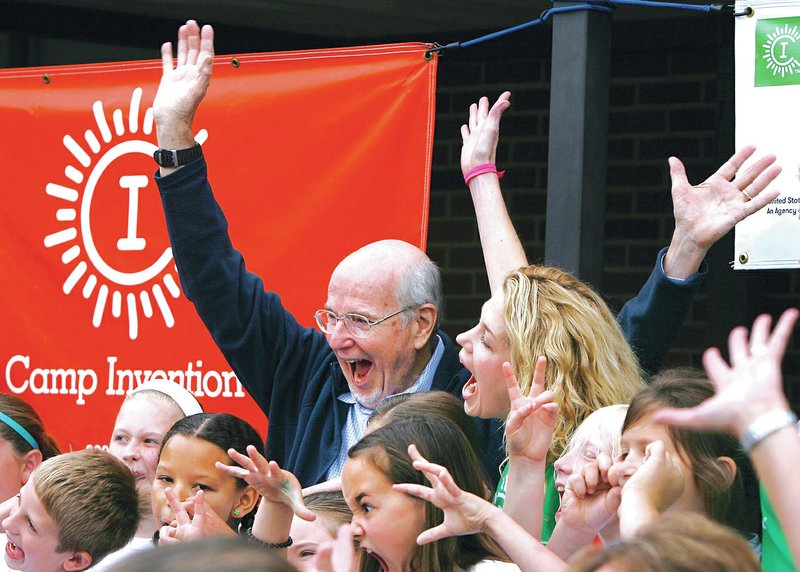FAYETTEVILLE -- An inventor of the plasma display screen encouraged students at Camp Invention to try a variety of ways to solve a problem.
Robert Willson, who lives in Tahlequah, Okla., was on the faculty at the University of Illinois when he and two colleagues needed to invent a better display to connect to a computer learning system.
At A Glance
The Plasma Display
The plasma display was developed in 1964 at the University of Illinois in Champaign-Urbana by faculty members Robert Willson, Don Bitzer and Gene Slottow. The display was needed for a computerized learning system created by Bitzer. Traditional displays had no inherent memory, lacked high brightness and contrast, and flickered. Their approach resulted in a display that won the Industrial Research 100 Award in 1967. Early plasma displays had high power consumption and screen burn-in. They now provide accurate color reproduction, high contrast ratios, wide viewing angle and large screen refresh rates that allow good rendering of fast motion in movies and sports.
Source: National Inventors Hall Of Fame
"We had a problem and had to solve it," Willson told the young inventors. "We didn't know we couldn't solve the problem. We just tried different things."
"That's what you guys are doing," he said. "You are never wrong. You learn what doesn't work."
Camp Invention is a national program designed to stimulate children's creativity and enthusiasm for science.
After meeting Thursday morning with the 98 campers in the gymnasium at Leverett Elementary School, Willson visited each of the classrooms where they were working on their inventions.
Lydia Gill, 9, was decorating her nature-inspired, propeller-powered car. The car is designed to travel on land, in the air and in water. It's battery-powered and about twice the size of a Matchbox car. A helium-filled balloon is attached to the rear of it.
Willson spent several minutes asking Lydia how she designed, assembled and tested it.
Lydia told Willson she loved learning about science.
He also visited with students who were designing pinball machines made from cardboard sheets and tubes, string, yarn, tape and colored markers.
One group of campers experimented with the sense of taste. They were given a test strip treated with a substance to make it taste bitter. Most of the students headed to a drinking fountain to wash the taste away.
Lindsey Scogin, 10, said it tasted "very bitter." Asked what it compared to, she said it didn't taste like anything she had tasted before.
Teacher Sarah Sullivan said students who found the strip bitter were super tasters who had sensitive taste buds. She told the group to work in teams to design and build a machine that would turn nasty tasting food into food good enough to eat.
Anna Ziegler, 11, said she likes the camp because "you can do anything and you get new experiences every year."
The camp concludes today for the 98 campers in first through sixth grades. An earlier session was at Butterfield Trail Elementary School.
Asked if he had a plasma screen television at his home in Tahlequah, Okla., Willson said, "Oh yes, but I had to wait about 15 years for the price to go down. They were very expensive."
NW News on 07/18/2014
